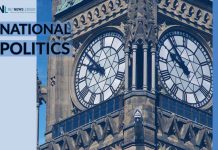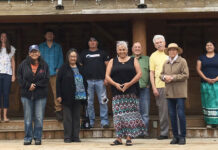In the opening days of 2010, the world travelled to the West Coast for the Winter Olympics.
“These games are Canada’s games,” then-prime minister Stephen Harper announced, “that we shall offer to our children and our children’s children as examples of what it means to be Canadian.”
It was an economic and cultural windfall for British Columbia and Canada, perhaps remembered best for Sidney Crosby’s dramatic overtime golden goal to defeat the United States.
For Indigenous peoples though, the 2010 Olympics was a stark reminder of reality.
Vancouver and Whistler sit on unceded Indigenous territories.
Stolen land.
In the leadup to the Games, the organizing committee attempted to include some Indigenous elements — the Inukshuk logo and the partnership with the Four Host First Nations, as examples — but it’s interesting to note the same scene taking place a decade later.
The opening days of 2020 will come with Canada’s predictable approval of the Trans Mountain Expansion Project — a pipeline it owns — and countless arrests of Indigenous peoples resisting more theft of their territories.
This isn’t the only cycle repeating itself. The year 2010 also came with a tepid “statement of support” from the Harper government of the United Nations Declaration on the Rights of Indigenous Peoples, which it called “aspirational” and a “non-legally binding document that does not reflect customary international law nor change Canadian laws.”
The federal government is promising to implement UNDRIP as one its first acts of 2020. Not being tepid, at least.
Cycles like these have been interrupted at times, and this may be what this decade is known for.
The biggest interruption came in late 2012 with Idle No More, arguably the largest social activist movement in Canada in decades. For more than six months, Indigenous youth-led peaceful demonstrations on the streets, on social media and in round dances in malls, calling for a change in Canada’s violent relationship with Indigenous peoples.
Idle No More — which continues — changed the conversation between Indigenous and non-Indigenous peoples in this country. It demonstrated the capability, power and savvy of Indigenous communities, and how Canada’s theft of lands, systemic oppression and denial of treaty and Indigenous rights could not continue unabated.
In many ways, Idle No More contributed to the downfall of Stephen Harper, whose relationships with Indigenous peoples had become rancorous and nearly invisible. In the 2015 federal election, Indigenous voters turned out in record numbers, shifting the balance of control in dozens of ridings and electing a record number — 10 — of Indigenous MPs.
Another interruption came in 2015 and the release of the final report of the Truth and Reconciliation Commission. While Harper had apologized in 2008 for residential school policy, the 94 calls to action offered by the commissioners (full disclosure: one of whom was my father) gave Canada a road map out of the violent and divisive legacies that characterize it.
The decade’s greatest potential for change — and arguably its greatest repeater of historical cycles — has been Prime Minister Justin Trudeau. There was hope for a man who stood at the unveiling of the commission’s final report and, with tears in his eyes, publicly and fully committed to the 94 calls, declaring that “no relationship is more important to me and to Canada than the one with First Nations, the Métis, and Inuit… I give you my word that we will renew and respect that relationship.”
I remember believing him.
“I wonder what’s gonna happen with the Indian Act,” I remember saying to my sister that day. “Reconciliation is impossible with that.”
News flash: it’s still here.
So are Canada’s cycles. The past five years have represented arguably the most contradictory series of laws, promises and confusing attitudes toward Indigenous peoples in more than a century.
Trudeau appointed the first Indigenous justice minister and made her the face of Indigenous policies for the Canadian government. Then, when she refused to make a decision that compromised her Indigenous ethics, he fired her.
There have been legislative steps, such as protecting Indigenous languages and the lifting of boil-water advisories, but for every good moment there’s a community declaring a state of emergency, experiencing overwhelming poverty, suicide or sickness, or another marching to the Supreme Court over violations of their rights.
The government created the Murdered and Missing Indigenous Women and Girls Inquiry and then virtually sabotaged it with a restrictive timeline, an impossibly broad mandate (how could anyone “examine the systemic causes of all forms of violence against Indigenous women, girls and members of the LGBTQ2S community in Canada” in two years?), and a denial of the deep, systemic problems within the inquiry itself — probably caused by stress.
For every law passed such as C-92, which proposes to hand Indigenous communities control of child welfare, the federal government appeals the Canadian Human Rights Tribunal decision stating on-reserve Indigenous children in care and their families have been discriminated against and deserve compensation.
It’s almost as if cycles never change in Canada unless Indigenous peoples inspire and lead.
While reality marches on — and most of Canada’s land is still stolen, more conflict is on the horizon, and Indigenous resistance continues to be a national story — this is a message worth remembering as we begin 2020.
 Niigaan Sinclair
Niigaan Sinclair
Originally appeared in the Winnipeg Free Press in November 2019. Republished with the permission of the author.
The views, opinions and positions expressed by all columnists and contributors are the author’s alone. They do not inherently or expressly reflect the views, opinions and/or positions of NetNewsLedger.







